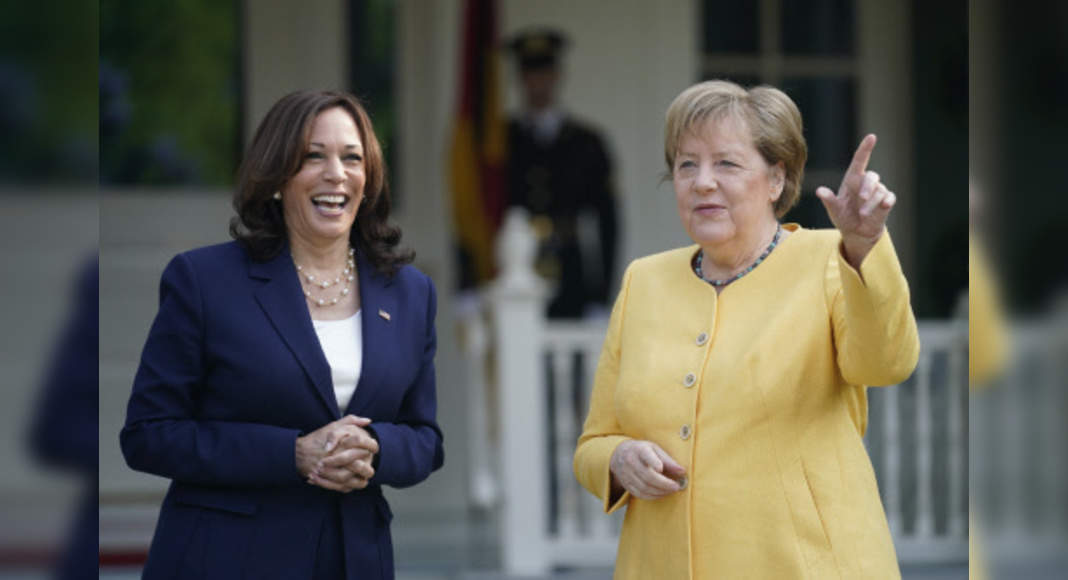WASHINGTON: Angela Merkel’s farewell visit to the White House was shadowed on Thursday by pressing issues as well as good will, as she prepared to sit down with Joe Biden to discuss differences over a major Russian pipeline and national views on China as a rising global power.
The German chancellor, who is not seeking another term in September elections, is nearing the end of a political career that has spanned four American presidencies.
Merkel started her day with a working breakfast with Vice President Kamala Harris, and Harris’ office said the two had a “very candid discussion,“ “In part, this is a farewell visit.
In part, she is signaling continuity and stability in the German-US relationship,” said Johannes Thimm, a senior fellow at the German Institute for International and Security Affairs, a think tank in Berlin.
Back home in Germany, Merkel’s country and neighboring Belgium dealt with the aftermath of heavy flooding that left more than 30 people dead and dozens missing.
“My sympathy goes to the relatives and of the dead and missing,” she said.
Officials in Washington and elsewhere are wondering what course Germany might take after the September vote.
The chancellor will seek to reassure the Americans that there won’t be a huge shift, Thimm said.
Merkel’s party is leading in polls, but the environmentalist Greens and the center-left Social Democrats are also vying to lead a future government.
While the three parties differ in many policy areas, all are committed to a strong trans-Atlantic relationship.
One sour note that preceded and outlasted the Donald Trump era of diplomatic discord has been a new pipeline taking natural gas from Russia to Germany.
The United States has long argued that the Nord Stream 2 project will threaten European energy security by increasing the continent’s reliance on Russian gas and allowing Russia to exert political pressure on vulnerable Eastern and Central European nations.
However, Biden recently waived sanctions against German entities involved in the project, a move that angered many in Congress.
Biden is expected to raise his concerns about the pipeline project with Merkel, but the White House was not anticipating any sort of formal announcement to come from their talks, according to a Biden administration official who briefed reporters before Merkel’s visit.
Senator Marco Rubio, a Florida Republican, in a letter to Biden on Thursday raised concerns that the pipeline is already having an economic impact on US ally Ukraine.
Rubio said that Gazprom, the company that operates Nord Stream 2, “has already started to reduce its use of pipelines in Ukraine” as the new gas pipeline nears completion.
“I urge you to convey to Chancellor Merkel that there is broad bipartisan support for preventing the completion of yet another pipeline that bypasses Ukraine,” Rubio wrote to Biden.
“I further call on you to press Chancellor Merkel to support Ukraine against Russia’s aggression.” Merkel has tried to dampen expectations for an imminent breakthrough, but she probably will want to resolve the issue before leaving office.
“It weighs on German-US relations and German-EU relations,” Thimm said.
While German officials have been unusually coy about which topics will be discussed during the trip, Merkel’s spokesperson confirmed on Wednesday that China will come up.
“That can be said with relative certainty,” Steffen Seibert told reporters.
“This also played an important role at the G-7 summit, where the chancellor and the American president last met.” Germany has strong trade ties with China but has also been critical of Beijing’s human rights record.
Merkel is keen to avoid a situation in which Germany, or the European Union, might be forced to choose sides between China and the United States.
Merkel has insisted on the need to cooperate with China on global issues such as climate change and the coronavirus pandemic, even while then-President Trump was accusing Beijing of having started it.
The humanitarian group Doctors Without Borders urged Biden to lean on Merkel to drop her opposition to proposals for suspending vaccine patents.
Merkel, a trained scientist, has argued that lifting the patents wouldn’t be effective and could harm future research and development efforts.
A group of Democratic lawmakers called on Germany to drop its “blockade” of a Covid-19 related waiver of intellectual property rights under global trade rules.
Such a waiver, the lawmakers argued, would help scale production of effective vaccines around the world.
The Biden administration has expressed support for the waiver being discussed at the World Trade Organization, but White House officials do not anticipate differences being resolved during Merkel’s visit.
While there are points of tension, Biden seems eager to offer Merkel a proper farewell.
Harris hosted Merkel for breakfast at her residence on the grounds of the US Naval Observatory before Merkel’s afternoon meeting with Biden and a joint news conference.
The president plans a small dinner in honor of Merkel.
Harris greeted Merkel as she arrived at the residence and commended the chancellor for her “extraordinary career.“ Merkel in turn noted the historic nature of the Harris vice presidency.
“I can only say that I’m delighted, too, for this opportunity here to meet the first madam vice president of the United States of America,” Merkel said before the two leaders stepped into a residence to talk over a breakfast of Gruyere souffle, seasonal fruit, and charcuterie.
Also Thursday, Merkel received an honorary doctorate (her 18th) from Johns Hopkins University and spoke at the university’s school of advanced international studies.






